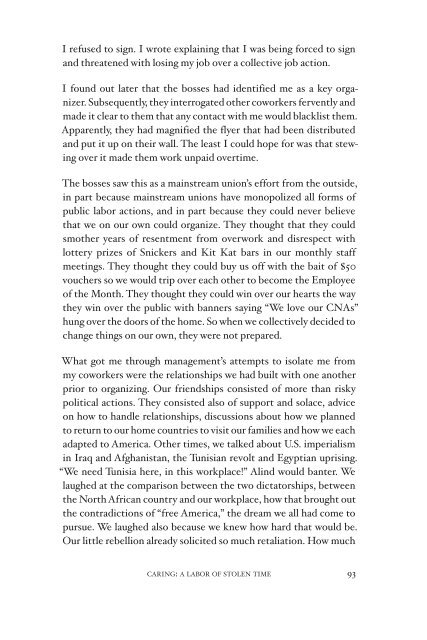Lies: A Journal of Materialist Feminism - Libcom
Lies: A Journal of Materialist Feminism - Libcom
Lies: A Journal of Materialist Feminism - Libcom
Create successful ePaper yourself
Turn your PDF publications into a flip-book with our unique Google optimized e-Paper software.
I refused to sign. I wrote explaining that I was being forced to sign<br />
and threatened with losing my job over a collective job action.<br />
I found out later that the bosses had identified me as a key organizer.<br />
Subsequently, they interrogated other coworkers fervently and<br />
made it clear to them that any contact with me would blacklist them.<br />
Apparently, they had magnified the flyer that had been distributed<br />
and put it up on their wall. The least I could hope for was that stewing<br />
over it made them work unpaid overtime.<br />
The bosses saw this as a mainstream union’s effort from the outside,<br />
in part because mainstream unions have monopolized all forms <strong>of</strong><br />
public labor actions, and in part because they could never believe<br />
that we on our own could organize. They thought that they could<br />
smother years <strong>of</strong> resentment from overwork and disrespect with<br />
lottery prizes <strong>of</strong> Snickers and Kit Kat bars in our monthly staff<br />
meetings. They thought they could buy us <strong>of</strong>f with the bait <strong>of</strong> $50<br />
vouchers so we would trip over each other to become the Employee<br />
<strong>of</strong> the Month. They thought they could win over our hearts the way<br />
they win over the public with banners saying “We love our CNAs”<br />
hung over the doors <strong>of</strong> the home. So when we collectively decided to<br />
change things on our own, they were not prepared.<br />
What got me through management’s attempts to isolate me from<br />
my coworkers were the relationships we had built with one another<br />
prior to organizing. Our friendships consisted <strong>of</strong> more than risky<br />
political actions. They consisted also <strong>of</strong> support and solace, advice<br />
on how to handle relationships, discussions about how we planned<br />
to return to our home countries to visit our families and how we each<br />
adapted to America. Other times, we talked about U.S. imperialism<br />
in Iraq and Afghanistan, the Tunisian revolt and Egyptian uprising.<br />
“We need Tunisia here, in this workplace!” Alind would banter. We<br />
laughed at the comparison between the two dictatorships, between<br />
the North African country and our workplace, how that brought out<br />
the contradictions <strong>of</strong> “free America,” the dream we all had come to<br />
pursue. We laughed also because we knew how hard that would be.<br />
Our little rebellion already solicited so much retaliation. How much<br />
CARING: A LABOR OF STOLEN TIME 93

















